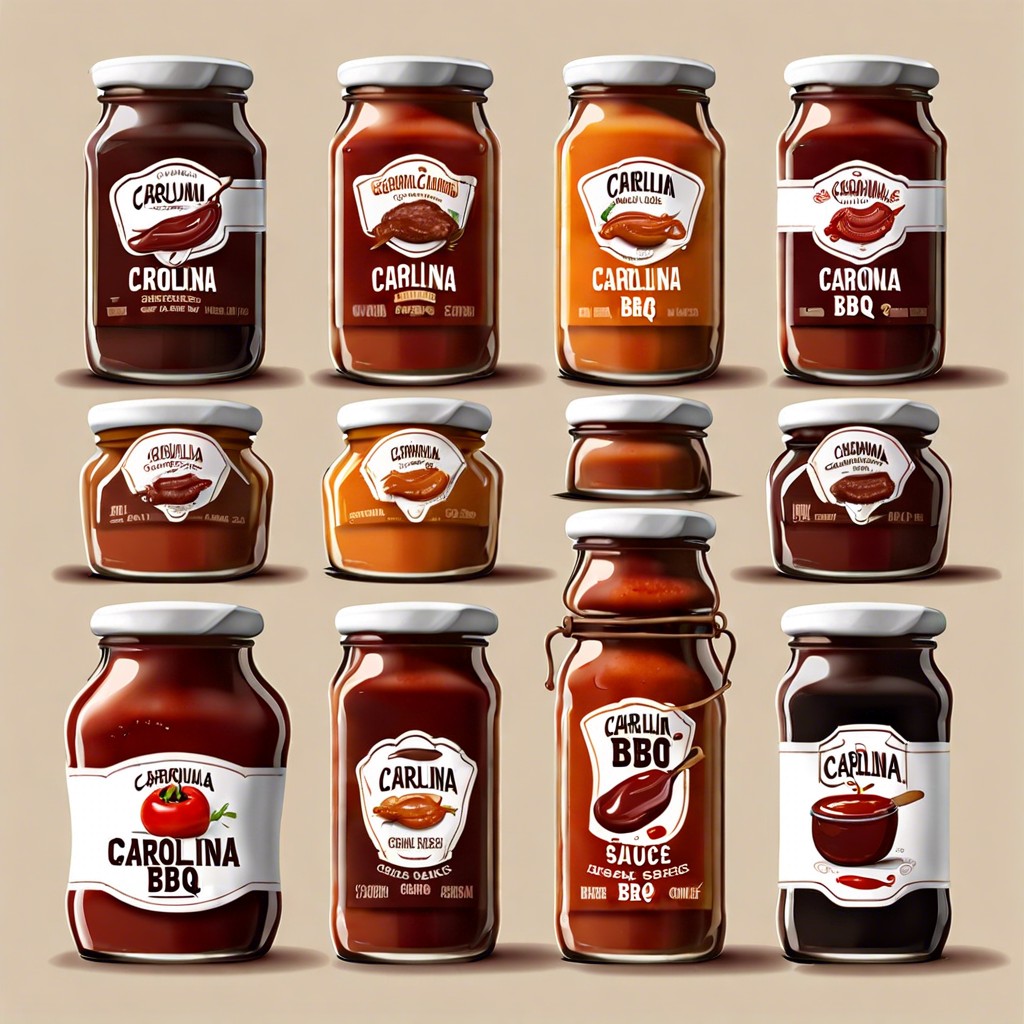Discover the distinctive flavors and variations of Carolina BBQ sauce and how to use it to enhance your barbecued dishes.
Key takeaways:
- Carolina BBQ sauce has distinct variations: Eastern, Western, and Mustard-based.
- Carolina BBQ sauces enhance the natural flavors of meat.
- Cooking methods for Carolina BBQ sauces involve simmering and blending.
- Carolina BBQ sauce pairs well with pulled pork and smoked chicken.
- Proper storage and refrigeration are important for the longevity of Carolina BBQ sauce.
Types of Carolina BBQ Sauce

Carolina BBQ sauce breaks tradition with a tangy twist distinct from the sweet and thick sauces often slathered across the nation’s ribs and pulled pork. The primary division within the style differentiates between the Eastern and Western variants.
Eastern Carolina sauce hinges on a thin, vinegar-based mixture, spiked generously with spicy, hot pepper flakes that cut through the richness of the smoked meat. The simplicity of the ingredients allows the flavor of the pork to reign supreme.
Western, or Piedmont, Carolina sauce marries the sharpness of vinegar with the subtle sweetness of tomatoes or ketchup, introducing a duality of flavor. This balance creates a more nuanced sauce while still maintaining a thinner consistency that enhances rather than overwhelths the meat.
South Carolina introduces a third contender: mustard-based sauce. Known for its pronounced tang and slight sweetness, this golden-hued condiment is a beloved accompaniment to chicken and pork, offering a bold alternative within the Carolina sauce family.
Each variant represents a rich tradition, encouraging experimentation and regional pride, and showcases the diverse palate that Carolina BBQ brings to the world of outdoor cooking.
Characteristics of Carolina BBQ Sauces
Distinctive in flavor and light in viscosity, Carolina BBQ sauces provide a sharp contrast to the thick, sweet sauces prevalent in other BBQ traditions. The Eastern Carolina sauce, known primarily for its vinegar base, assaults the palate with a tangy, spicy kick, usually accentuated by red pepper flakes. This liquid consistency penetrates the meat effortlessly, marrying smoky flavors with acidic undertones.
Transitioning to the central part of the state, the Lexington style introduces ketchup into the mix, creating a harmony between tangy and subtly sweet notes, while maintaining a thinner consistency. It complements pork shoulder and ribs without overshadowing the rich, smoky meat.
Venturing down to South Carolina, the sauce takes a unique turn with a mustard base, commonly referred to as Carolina Gold. This bold, yellow sauce delivers a tangy and sweet flavor profile with a gentle heat, creating a perfect accompaniment particularly to pork dishes. The combination of vinegar, mustard, and sweetness offers a gastronomic nod to the region’s German heritage.
Despite their differences, all Carolina BBQ sauces share a focus on enhancing the meat’s natural flavors without overpowering them, allowing the smoke and the seasoning of the meat to take center stage.
Cooking Methods for Carolina BBQ Sauces
When preparing a Carolina BBQ sauce, the process is relatively simple yet critically impacts the final flavor. Start by combining your ingredients in a saucepan over medium heat. For vinegar-based sauces, simmer the mixture until the flavors meld—typically around 15-20 minutes, stirring occasionally to prevent scorching. For sauces incorporating mustard or ketchup, cook them long enough to integrate all ingredients, usually not more than 10 minutes, as extended heating can result in a muted tang, the hallmark of Carolina sauce.
If aiming for a smoother consistency, especially for thicker, tomato-based sauces from the western part of the Carolinas, blending the sauce after cooking can unify textures and flavors. Always allow the sauce to cool before bottle storage to maintain its integrity. When incorporating the sauce into your barbecue, brushing it onto the meat during the final stages of smoking or grilling adds a glaze that complements the smoky profile. For pulled pork, a staple of Carolina barbecue, mixing the sauce into the meat post-shredding allows it to absorb the flavors more thoroughly.
Serving Suggestions
Pairing this tangy condiment with pulled pork is a match made in heaven, accentuating the rich flavors of the meat. Drizzle it over smoked chicken to add a zesty punch, balancing the natural juiciness with acidity.
It’s not just for meat, though; try using it as a zesty dressing on coleslaw or tossed into a pasta salad for a uniquely Southern twist.
Dunk your burnt ends or ribs into this sauce to elevate the barbecue experience. Unconventional uses include mixing it into ground meat for burgers or meatloaf, which imparts a subtle tang and keeps the dish moist.
Storage and Shelf Life
Proper storage enhances the longevity of Carolina BBQ sauce, ensuring its flavor and safety. For homemade sauce, refrigeration is essential; it can be stored in an airtight container for up to 2 weeks.
A clear sign to discard the sauce is the presence of mold or an off smell. Store-bought varieties offer a longer shelf life due to preservatives and should be kept refrigerated after opening, respecting the expiration date on the label.
To maintain the sauce’s integrity, avoid cross-contamination by using clean utensils each time.